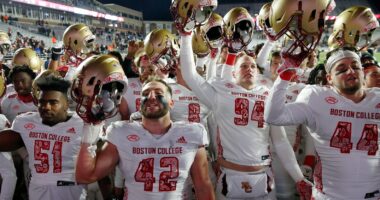.

Massachusetts lawmakers have proposed a sports betting bill that would permit wagering on the in-state team, but it is important to note that this scenario is highly contingent on a Massachusetts team making it to the College Football Playoff.
Last week, Massachusetts lawmakers made a distinctive compromise on college wagering while passing sports betting legislation. The conference committee decided to prohibit placing bets on in-state college teams, except in cases where they participate in tournaments consisting of four or more teams.
The purpose of the carveout is to permit betting on local college basketball teams participating in the NCAA Tournament.
However, according to Rep. Jerald Parisella, a member of the conference committee, there is a specific rationale behind establishing the tournament with a minimum of four teams.
At present, the College Football Playoff consists of a total of four teams.
According to Parisella, if there are four or more teams participating, it is allowed to place bets on Massachusetts teams. This condition is clearly stated in the bill. Therefore, it is reasonable to assume that if Boston College were to qualify for the College Football Playoffs, it would be permissible to bet on them within Massachusetts. Considering Boston College’s past success, there is a chance for them to have a remarkable performance. Alternatively, it is also possible for UMass to surprise everyone and qualify for the playoffs.
Mass. team could make College Football Playoff
At present, it appears highly improbable for a Massachusetts team to secure a spot in the College Football Playoff. Boston College has yet to achieve a top-four ranking in the Associated Press poll and their last appearance in the Atlantic Coast Conference (ACC) championship game dates back to 2008.
UMass, having transitioned to a higher division classification ten years ago, has yet to compete in a Division I FBS bowl game.
However, legislators are making preparations for the future of sports betting. Additionally, it is not implausible to envision a Massachusetts team participating in the College Football Playoff within the next ten years. The NCAA has been contemplating the expansion of the playoff system to include 12 or even 16 teams, leading to the likelihood of a modification occurring by 2026.
In its history, Boston College has achieved six AP finishes within the top 16, with the most recent one occurring in 2007.
Wagers allowed on college games in Massachusetts
In the year 2025, the Army-Navy game will be held at Gillette Stadium, offering Massachusetts bettors the opportunity to place wagers on the game featuring two out-of-state college teams.
The inaugural Fenway Bowl, scheduled for December 17th, will be held at Fenway Park. This exciting event will showcase teams from both the ACC and the American Athletic Conference (AAC).
If an NCAA Tournament regional were to be hosted at a venue in Massachusetts, betting would also be permitted on all the games.
O’Connor expressed his satisfaction with the decision to not prohibit betting on college games in the state. He believes that such a ban would diminish the appeal of Massachusetts bidding for the NCAA Tournament or hosting a game at Fenway. According to him, these activities are closely connected to people’s desire to place bets on them.
How lawmakers reached college betting compromise
As the formal legislative session neared its conclusion, it appeared that the discussion surrounding college sports had the potential to derail the bill.
After receiving feedback from presidents and athletic directors at local colleges, the Senate decided not to include college wagering in its bill, unlike the House.
The exclusion of bets solely on in-state college teams appeared to be a straightforward agreement, with ten states, such as New York and New Jersey, permitting wagering on college sports but disallowing bets on teams from within their own state.
However, the Massachusetts conference committee went beyond that and included a condition specifically regarding tournaments.
According to Sen. Patrick O’Connor, we were informed by lobbyists and casinos that March Madness is highly favored for sports betting. MGM and other establishments emphasized the popularity of this period for gambling. Additionally, Sen. O’Connor believes that regardless of regulations, people will always find a means to place bets on such events.
In reality, O’Connor believes that there is not much interest in betting on regular-season Massachusetts college teams. However, the carveout will apply to local teams participating in significant events like the NCAA Tournament, ACC Tournament for college basketball, College Football Playoffs, and the annual Beanpot hockey tournament involving Boston College, Boston University, Northeastern University, and Harvard. Furthermore, the provision will enable betting on Massachusetts teams during early-season college basketball events such as the Maui Invitational or the Battle 4 Atlantis.
O’Connor believes that Massachusetts’ approach to college sports betting will serve as a model for other states to adopt.
O’Connor suggested that states prohibiting in-state college wagering should consider the Massachusetts law as a model due to the distinctive approach it takes in distinguishing colleges within the state. He emphasized that the carveout in the law is logical and recommended that other states adopt a similar provision.






